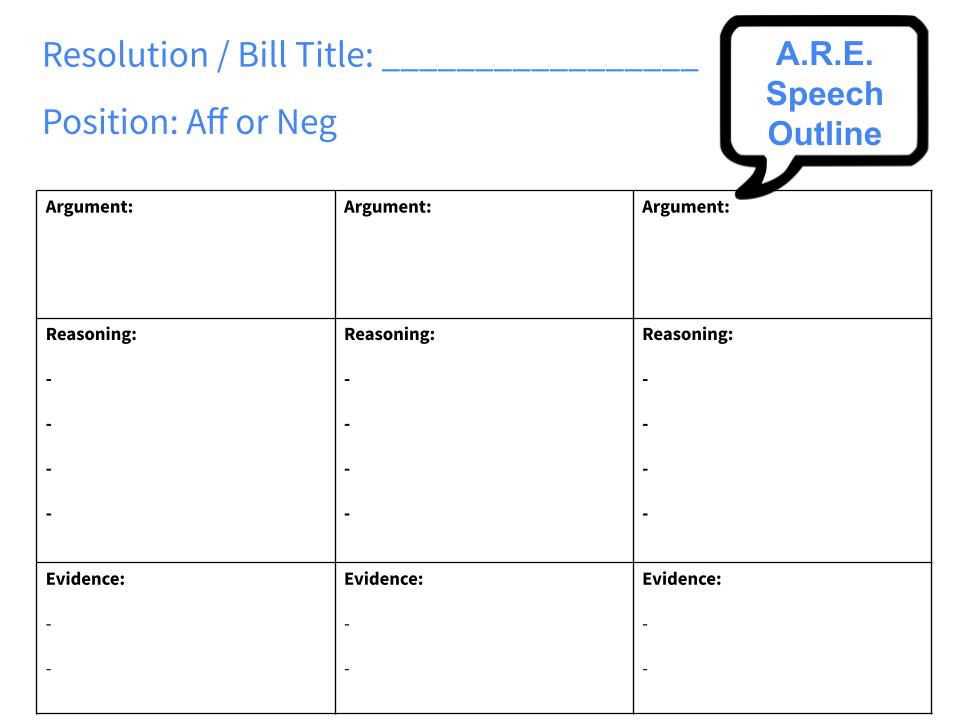Student Congressional Debate Topics

Welcome to the student congressional debate topics page, where we present three sample student congress bills on important issues affecting our society today. As the world continues to evolve, addressing pressing concerns such as cryptocurrency regulation, electric vehicle charging infrastructure development grants, and mandatory drug education in schools can promote healthy debate.
We have carefully crafted these bills to encourage healthy discussion and teach about these contemporary student congressional debate topics such as drug education, electric vehicles, and cryptocurrency. We hope they will serve as a starting point for congressional debate legislation. After the bills and speech samples you will find an additional ten student congressional debate topics and several ideas for legislation on each.
Page Contents
- Sample Student Congress Bill #1: Drug Education
- Quick Tip: A Bill vs. A Resolution
- Sample Student Congress Bill #2 - EV Infrastructure
- A.R.E. x 3 - How to Prepare an Excellent Congress Speech
- Sample Student Congress Speech #1: Speech in Support of the Bill to Provide Grants to Promote EV Infrastructure
- Sample Student Congress Speech #2: This Speech Supports the Bill to Provide Grants to Promote EV Infrastructure
- Sample Student Congress Bill #3: Cryptocurrency Regulation Task Force
- Sample Student Congress Authorship Speech: To implement a cryptocurrency regulation task force
- 10 Student Congressional Debate Topics
Sample Student Congress Bill #1
Drug Education
Title: Drug Education and Awareness Enhancement Act
BE IT ENACTED BY THE STUDENT CONGRESS
Preamble: The purpose of this bill is to address the growing concern of illegal drug use among students by incorporating education and awareness about illegal drugs into existing classes such as health, driver's education, or physical education. Integrating this essential knowledge into the existing curriculum aims to empower students with the tools to make informed decisions and promote a drug-free lifestyle.
SECTION 1: Definitions
1.1. Illegal drugs: Substances classified as illegal or controlled under federal or state law, including but not limited to marijuana, cocaine, heroin, methamphetamine, and other synthetic drugs.
1.2. Education and awareness: Providing information and guidance on the risks, effects, and consequences of illegal drug use, as well as available resources for prevention and assistance.
1.3. Existing classes: Courses currently taught in schools, such as health, driver's, or physical education.
SECTION 2: Integration of Drug Education and Awareness
2.1. All schools offering health, driver's education, or physical education classes shall integrate a comprehensive drug education and awareness program into their curriculum.
2.2. The drug education and awareness program shall cover, at a minimum, the following topics:
a) The types of illegal drugs and their effects on the human body.
b) The short-term and long-term consequences of illegal drug use.
c) The dangers of driving under the influence of drugs.
d) The legal ramifications of drug possession and use.
e) The impact of drug use on academic and professional life.
f) Prevention strategies and available resources for students seeking help for themselves or others.
SECTION 3: Guidelines and Resources
3.1. The Department of Education shall develop guidelines and provide resources to assist schools in implementing the drug education and awareness program, including but not limited to:
a) Curriculum outlines and lesson plans.
b) Educational materials, such as pamphlets, videos, and interactive content.
c) Information on local, state, and national resources for prevention and assistance.
3.2. Teachers responsible for delivering the drug education and awareness program shall receive training on the subject matter and best practices for communicating the information to students.
SECTION 4: Program Evaluation
4.1. Schools shall conduct an annual evaluation of the drug education and awareness program to assess its effectiveness and identify areas for improvement.
4.2. The Department of Education shall collect data on the prevalence of illegal drug use among students and analyze the impact of the drug education and awareness program on these rates.
SECTION 5: Funding
5.1. The necessary funds for implementing, training, and evaluating the drug education and awareness program shall be allocated from existing federal and state education budgets.
SECTION 6: Enactment
6.1. This bill shall take effect at the beginning of the next academic year following its passage.
Quick Tip: A Bill vs. A Resolution
Quick Tip: In a student congressional debate, it's essential to understand the difference between a Bill and a Resolution. A Bill outlines a specific, detailed plan of action that must be described thoroughly within the text. At the same time, a Resolution proposes a general idea for government action without delving into the specifics. Remember this distinction to engage in and contribute to the debate effectively regardless of the student congressional debate topics chosen!
Sample Student Congress Bill #2
EV Infrastructure
A BILL TO EXPAND ELECTRIC VEHICLE CHARGING INFRASTRUCTURE
To promote the widespread adoption of electric vehicles in the United States by providing grants to private industries to encourage the construction and expansion of electric vehicle charging infrastructure and other purposes.
Be it enacted by the Senate and House of Representatives of the United States of America in Congress assembled,
SECTION 1. SHORT TITLE.
This Act may be cited as the "Electric Vehicle Charging Infrastructure Expansion Act of 2023".
SEC. 2. FINDINGS.
Congress finds the following:
(1) The widespread adoption of electric vehicles (EVs) is essential to reducing greenhouse gas emissions, improving air quality, and promoting energy independence in the United States.
(2) A robust network of charging infrastructure is critical to ensuring the practicality and convenience of electric vehicles for consumers.
(3) The private sector is vital in developing and expanding the electric vehicle charging infrastructure.
(4) The provision of grants to private industries to support the construction of charging stations will accelerate the growth of the charging infrastructure, create jobs, and stimulate economic growth.
SEC. 3. DEFINITIONS.
In this Act:
(1) "Charging infrastructure" means equipment and systems that charge electric vehicles, including charging stations, connectors, and related hardware.
(2) "Electric vehicle" means any on-road vehicle that uses an electric motor for propulsion and relies on a rechargeable battery for energy storage.
(3) "Eligible entity" means any private sector company, organization, or individual involved in the design, construction, operation, or maintenance of charging infrastructure.
SEC. 4. ESTABLISHMENT OF GRANT PROGRAM.
(a) IN GENERAL.—The Secretary of Energy shall establish a grant program to assist eligible entities in constructing and expanding electric vehicle charging infrastructure in the United States.
(b) APPLICATION.—An eligible entity seeking a grant under this section shall submit an application to the Secretary of Energy at such time, in such manner, and containing such information as the Secretary may require.
(c) PRIORITY.—In awarding grants under this section, the Secretary of Energy shall give priority to projects that:
(1) Are located in areas with limited or no existing charging infrastructure;
(2) Demonstrate the most significant potential to encourage widespread adoption of electric vehicles;
(3) Utilize innovative technologies or approaches to charging infrastructure design, construction, and operation; and
(4) Leverage partnerships with local governments, utilities, or other stakeholders to maximize the impact of the grant funds.
SEC. 5. AUTHORIZATION OF APPROPRIATIONS.
(a) IN GENERAL.—There is authorized to be appropriated $500,000,000 for each fiscal year 2024 through 2028 to carry out the grant program established under section 4 of this Act.
(b) ADMINISTRATIVE EXPENSES.—Not more than 3 percent of the amount appropriated under subsection (a) for a fiscal year may be used for the administrative expenses of the grant program.
SEC. 6. REPORT TO CONGRESS.
No later than two years after the enactment of this Act Secretary of Energy shall report to congress on the construction and expansion of electric vehicle charging infrastructure.
SECTION 7. IMPLEMENTATION
This bill shall take effect 90 days after its passage into law.
A.R.E. x 3
How to Prepare an Excellent Speech for Student Congressional Debate Topics

To help you further, we have included sample authorship speech outlines for each bill using the A.R.E. x 3 structure taught by some congressional debate lessons. Download and print the above A.R.E. graphic organizer to prepare your speech for any of the student congressional debate topics.
The A.R.E. acronym stands for argument, reasoning, and evidence, similar to Toulmin’s claim, data, and warrant structure for a good argument. We invite you to read on and join us in shaping a better future for all through learning to engage in academic debate.
Sample Student Congress Speech #1
Speech in Support of the Bill to Provide Grants to Promote EV Infrastructure
This Speech Supports a Claim of Inadequate EV Charging Infrastructure
Several observations verify the problem of a lack of electric vehicle (EV) charging infrastructure in the United States.
Firstly, the number of electric vehicles on the road is increasing, but the charging infrastructure needs to keep up with the pace of adoption. According to the International Energy Agency, the number of electric cars on the road reached 10 million in 2020, with more than 3 million sold in that year alone. However, the number of public charging stations has not kept pace with the increase in electric vehicles.
Secondly, there is a significant disparity in charging infrastructure availability across different regions of the United States. While some cities and regions have many charging stations, others need more infrastructure. Inadequate charging stations can make it difficult for EV owners to travel long distances, especially in areas where charging stations are few and far between.
Thirdly, there needs to be more standardization in charging infrastructure in the United States. Different electric vehicles require different types of charging stations, and multiple charging standards are in use, which can create confusion and make it difficult for businesses and individuals to invest in the infrastructure.
Fourthly, the availability of charging infrastructure is critical to adopting electric vehicles. Without sufficient charging infrastructure, consumers may hesitate to purchase an electric vehicle due to the fear of running out of battery power and being stranded. This need for charging infrastructure may deter businesses from investing in electric vehicle fleets.
Lastly, the federal government has recognized the need to invest in electric vehicle charging infrastructure to support the transition to electric vehicles. In 2021, President Biden proposed a $174 billion investment in electric vehicles, including funding for charging infrastructure. This proposal is an acknowledgment of the lack of infrastructure currently available and the need for further investment to support the growth of electric vehicles in the United States.
In summary, the need for electric vehicle charging infrastructure in the United States is a real problem that hinders the adoption of electric vehicles and limits their potential for reducing emissions and promoting sustainable transportation.
I urge your support of this critical bill and to join me in promoting EV charging infrastructure by establishing grants to private industry. Thank you.
Sample Student Congress Speech #2
This Speech Supports the Bill to Provide Grants to Promote EV Infrastructure
Do grants promote private company actions in areas such as building infrastructure?
Yes, grants can promote private company actions in areas such as building infrastructure. Grants are a type of financial assistance provided by governments or other organizations to help fund specific projects or activities. For example, regarding infrastructure, grants can encourage private companies to invest in and build new infrastructure projects.
Grants can be particularly effective in promoting private company actions in areas where the potential benefits of the infrastructure project are not immediately apparent or where the project costs are high. For example, building charging infrastructure for electric vehicles may not be profitable for a private company in the short term. Still, grants can help offset some costs and encourage companies to invest in the infrastructure.
In addition to providing financial assistance, grants can also come with specific requirements or conditions that companies must meet to receive the funding. For example, a grant for building EV charging infrastructure may require the company to invest in a certain number of charging stations in a particular region or to build charging stations using a specific type of technology.
Overall, grants can be a powerful tool for promoting private company actions in areas such as building infrastructure, mainly when the private sector is hesitant to invest in these types of projects due to cost or uncertainty about the potential benefits.
I urge support for this critical bill. Join me in promoting EV charging infrastructure by establishing grants to private industry. Thank you.
Sample Student Congress Bill #3
Cryptocurrency Regulation Task Force
Bill Title: The Cryptocurrency Regulation Task Force Act
Purpose: To establish a task force dedicated to the federal regulation of cryptocurrency by the U.S. Securities and Exchange Commission (SEC), the Federal Trade Commission (FTC), and the International Revenue Service (IRS).
Section 1. Short Title
Cite this bill as the Cryptocurrency Regulation Task Force Act.
Section 2. Findings
Congress finds that the lack of federal regulation of cryptocurrency has led to increased fraud, market manipulation, and other abuses that threaten consumer protection, financial stability, and national security.
Section 3. Establishment of Cryptocurrency Regulation Task Force
(a) The U.S. Securities and Exchange Commission (SEC), the Federal Trade Commission (FTC), and the International Revenue Service (IRS) shall establish a task force dedicated to the federal regulation of cryptocurrency.
(b) The task force shall have the following duties and responsibilities:
(i) Develop a comprehensive regulatory framework for regulating cryptocurrency, including registering and licensing cryptocurrency exchanges and custodians and overseeing initial coin offerings (ICOs) and other cryptocurrency-related activities.
(ii) Monitor and investigate potential fraud and market manipulation in the cryptocurrency markets.
(iii) Guide individuals and businesses engaging in cryptocurrency-related activities regarding compliance with federal laws and regulations.
(iv) Coordinate with international regulatory bodies and law enforcement agencies to address cross-border cryptocurrency-related issues.
(v) Report annually to Congress on its activities and findings, including any legislative or regulatory recommendations.
Section 4. Funding
(a) This Act authorizes the appropriation of sums necessary to implement this Act.
(b) The task force shall have the authority to accept donations and grants from private entities, subject to applicable laws and regulations.
Section 5. Effective Date
This Act shall take effect on the date of its enactment.
Section 6. Severability
If any provision of this Act, or the application of such provision to any person or circumstance, is held to be unconstitutional, the remainder of this Act, or the application of such provision to persons or circumstances other than those as to which it is held to be unconstitutional, shall not be affected thereby.
Section 7. Congressional Review
This Act shall be subject to review by the appropriate committees of Congress within five years of its enactment to determine whether any modifications or amendments are necessary to achieve the purposes of this Act.
Section 8. Definitions
(a) Cryptocurrency shall mean any digital representation of value that is not a fiat currency and that functions as a medium of exchange, a unit of account, and/or a store of value.
(b) Initial coin offering (ICO) shall mean any offering of digital tokens or coins, whether or not registered under the securities laws, in exchange for consideration of any kind.
Introduced by: [INSERT NAME]
Date: [INSERT DATE]
Sample Student Congress Authorship Speech
For Sample Bill #3 above:
To implement a cryptocurrency regulation task force
Honorable Members of Congress,
I rise today to introduce the Cryptocurrency Regulation Task Force Act. This bill calls for the creation of a task force dedicated to the federal regulation of cryptocurrency by the U.S. Securities and Exchange Commission (SEC), the Federal Trade Commission (FTC), and the International Revenue Service (IRS).
As we have seen in recent years, the rise of cryptocurrency has led to a proliferation of fraud, market manipulation, and other abuses that threaten consumer protection, financial stability, and national security. Yet, while many states have taken steps to regulate cryptocurrency, a comprehensive federal regulatory framework still needs to be implemented. This need for a federal framework is why we need a task force dedicated to the federal regulation of cryptocurrency.
The task force established by this bill will have the following duties and responsibilities:
First, it will develop a comprehensive regulatory framework for regulating cryptocurrency, including registering and licensing cryptocurrency exchanges and custodians and overseeing initial coin offerings (ICOs) and other cryptocurrency-related activities.
Second, it will monitor and investigate potential fraud and market manipulation in the cryptocurrency markets.
Third, it will guide individuals and businesses engaging in cryptocurrency-related activities regarding compliance with federal laws and regulations.
Fourth, it will coordinate with international regulatory bodies and law enforcement agencies to address cross-border cryptocurrency-related issues.
Finally, the task force will report annually to Congress on its activities and findings, including any legislative or regulatory recommendations.
Establishing this task force is crucial to ensuring the safety and soundness of our financial system, protecting consumers from fraud and abuse, and promoting innovation in the cryptocurrency space. By working together, the SEC, FTC, and IRS can develop a comprehensive regulatory framework that will help address the risks associated with cryptocurrency while promoting its benefits.
I urge my colleagues to support this critical bill and to join me in establishing a task force dedicated to the federal regulation of cryptocurrency. Thank you.
10 Student Congressional Debate Topics
Here are some broad topics and sub-topics that could be used to write a bill or resolution for a classroom congressional debate:
Student congressional debate topics 1-5 include ideas for bills on climate change, educational reform, gun control, immigration, and healthcare.
1. Climate change:
- Increasing funding for renewable energy research and development
- Implementing a carbon tax to incentivize companies to reduce their carbon footprint
- Establishing a national goal for carbon neutrality by a specific date
- Mandating that new buildings meet strict energy efficiency standards
- Requiring all federal agencies to prioritize sustainability in their operations
2. Education reform:
- Increasing funding for K-12 public education
- Expanding access to pre-K programs
- Instituting a national teacher pay increase
- Reducing the emphasis on standardized testing in education
- Increasing funding for low-income and underrepresented student populations
3. Gun control:
- Implementing universal background checks for all gun purchases
- Banning assault weapons and high-capacity magazines
- Requiring gun owners to report lost or stolen firearms
- Mandating that gun owners safely store their firearms to prevent theft or unauthorized access
- Requiring individuals to obtain a license or permit to own a firearm
4. Immigration:
- Providing a pathway to citizenship for undocumented immigrants already living in the United States
- Streamlining the legal immigration process to reduce waiting times and increase access
- Increasing funding for border security and technology to prevent illegal crossings
- Requiring employers to verify the legal status of their employees
- Establishing a temporary worker visa program for industries that rely on immigrant labor
5. Healthcare:
- Expanding access to healthcare for all Americans, including those with pre-existing conditions
- Reducing healthcare costs for patients through measures such as negotiating lower drug prices
- Increasing funding for medical research and development
- Mandating that insurance companies cover essential health benefits
- Instituting a public option for healthcare coverage alongside private insurance options
Student congressional debate topics 6-10 include ideas for bills or resolutions related to technology and privacy, economic inequality, criminal justice reform, mental health, and foreign policy.
6. Technology and privacy:
- Regulating the collection and use of personal data by technology companies
- Requiring companies to obtain explicit consent from users before collecting their data
- Mandating that companies provide clear and concise privacy policies to users
- Establishing a national data breach notification standard
- Increasing funding for research into new privacy technologies and practices
7. Economic inequality:
- Raising the minimum wage to a livable wage
- Increasing taxes on the wealthy to fund programs that benefit low-income Americans
- Expanding access to affordable housing programs
- Providing universal basic income for all Americans
- Mandating that companies pay their workers a fair share of profits through profit-sharing programs
8. Criminal justice reform:
- Reducing mandatory minimum sentences for non-violent offenses
- Increasing funding for rehabilitation programs for inmates
- Ending the use of cash bail
- Requiring police officers to wear body cameras and report use-of-force incidents
- Increasing funding for community policing programs
9. Mental health:
- Increasing access to mental health services in schools and communities
- Providing funding for mental health research and development
- Expanding access to mental health resources for veterans
- Requiring insurance companies to cover mental health treatments at the same level as physical health treatments
- Mandating that mental health be included in comprehensive healthcare coverage options
10. Foreign policy:
- Requiring congressional approval for any military action taken by the President
- Increasing funding for international aid programs
- Supporting international efforts to combat climate change
- Strengthening diplomatic relations with allies and partners around the world
- Instituting sanctions or other diplomatic measures to address human rights abuses in other countries
We hope you will like one of these student congressional debate topics. If not, we invite you to comment and let us know that you want Best Speech Topics to publish more student congressional debate topics for consideration in your next legislative session.
Return to the Page Contents for this page, "Student Congressional Debate Topics."



